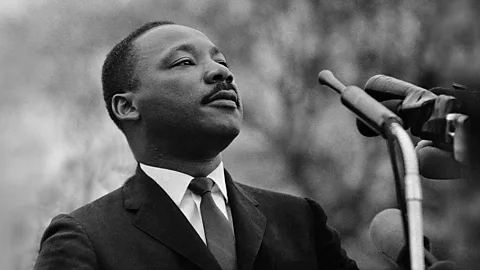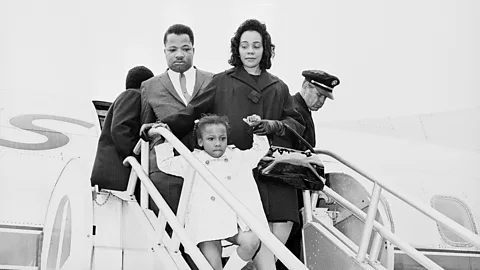In History: Martin Luther King Jr, a misunderstood icon of US history
 Getty Images
Getty Images"My work is simply an attempt to say to America that you have a marvellous ideal, and that you should live up to it," said Martin Luther King Jr in an exclusive 1961 BBC interview. What is the truth behind the mythology that surrounds the civil rights leader?
"It is never easy for one to accept the role of symbolism without going through constant moments of self-examination," the Reverend Dr Martin Luther King Jr told the BBC's Face to Face programme in 1961.
The BBC's interview took place between two milestones in the civil rights movement. It was recorded six years after King led the 381-day boycott of Montgomery's buses following Rosa Parks' refusal to give up her bus seat to a white man, and two years before he made his I Have a Dream speech at the 1963 March on Washington. John Freeman's interview explores the early experiences that helped to form King's political and ethical outlook.
Martin Luther King Jr is known as the face of the mid-20th Century fight for civil rights, a Nobel Peace Prize laureate and the only non-president whose birthday is a US holiday.
More like this:
- Nina Simone on how fury fuelled her songs
Born in a deeply segregated Atlanta, Georgia, on 15 January 1929, he was initially named Michael after his father Rev Michael King, who was senior pastor at Ebenezer Baptist Church in Atlanta. However, on a trip to Germany, King Sr was inspired to change his name and his son's name to Martin, after the leader of the Protestant Reformation.
In History
In History is a series which uses the BBC's unique audio and video archive to explore historical events that still resonate today.
Growing up in the church and experiencing a "relatively strict" upbringing, King Jr enrolled in Morehouse College at the age of 15 and joined his family's long line of pastors, earning a degree in divinity from Crozer Theological Seminary. Later, at Boston University, King earned a doctorate in systematic theology.
"I had no idea that I would be catapulted into a position of leadership and the civil rights struggle," says King.
MLK's legacy plays a principal role in the messy project of the United States. Even his most famous speech, I Have a Dream, is quintessentially American: inspired by the Bible, the Declaration of Independence, the US Constitution, and Abraham Lincoln's Emancipation Proclamation and the Gettysburg Address.
"My work is simply an attempt to say to America that you have a marvellous ideal, and that you should live up to it," says Martin Luther King in the BBC interview.
"This problem can be solved in the United States if enough people give themselves to it; if they devote their lives to breaking down all of the barriers that separate men from men on the basis of race or colour," he says.
Yet that was still a long way off. "The vast majority [of Black Americans] still confront problems of economic insecurity and social isolation," King told the BBC in 1961.
Today, his daughter, Dr Bernice King, tends to agree with her father's assessment. Bernice King tells the BBC that "token integration" remains pervasive and perfunctory.
"You'll see a little bit more than one token chosen, but it's still not a true representation across the board, especially in places of significant influence."
Legacy is top of mind for Bernice King: the legacy of her family, herself and the greater mission of nonviolent resistance. Her father represents a "vast yet comprehensive" inspiration for her work as a lawyer and minister.
"He had this great capacity to understand humanity and to speak in a way that pierced through and awakened people to a greater sense," she says.
Bernice King is MLK's youngest child, now the CEO of the King Center, a non-profit education site founded by her mother Coretta Scott King.
As a child, "I knew that I would have influence in some arena related to serving humanity," Bernice King says. She was five years old when her father was killed by a white supremacist in Memphis, Tennessee.
Remembering Dr Martin Luther King's memory "is a powerful political tool" in the story of the US, says Dr Hajar Yazdiha, a sociology scholar who wrote The Struggle for the People's King: How Politics Transforms the Memory of the Civil Rights Movement, which traced 40 years of the misuses of King's legacy (such as using MLK quotes to oppose the Obama presidency). The sanitisation of Dr King's life story has "dangerous consequences for democracy", says Dr Yazdiha, who believes that the stakes of misrepresenting such a key figure in US history are high.
"Our collective memories are the stories that make up our national identity, our understandings of who we are as a nation and as a people," Dr Yazdiha tells the BBC. "The way we tell the story teaches us who the heroes and villains are, both in the past and today."
Warning against the danger of "crafting a comfortable and quotable King" at the 2023 commemorative service for her father, Bernice King says that she "constantly studies and discovers" the complexities of Kingian non-violent resistance. "There's a great misunderstanding of my father because we've just studied a little portion of him that fits or aligns with the work we're doing."
The dangers of becoming a symbol
There is a risk of skewing history when a person becomes a symbol of a continuing movement, argues Dr Yazdiha. "The politics of revisionist history is not just about keeping us from understanding the past. It's about ensuring we cannot understand the present, because if we were to understand the roots of our present-day problems, we might be moved to come together and mobilise for deeper systemic change."
Both Bernice King and Dr Yazdiha point to the misreading of King in the US education system, especially the neatly tied and rose-tinted tales of the civil rights movement in textbooks. King's own remarks have been used in recent years to restrict education in the US, with laws passed in 44 states prohibiting racial education. There are even bans against books about MLK.
"It's been a consistent problem, the issue from the education standpoint," Bernice says. "I feel that is the place where we ought to discuss, to dialogue. That's the whole purpose of education."
 Getty Images
Getty ImagesIt's a deep and dangerous irony that King, today one of the most celebrated figures in US history, is misunderstood, says Dr Yazdiha – emphasising that he was a fierce campaigner against militarism, poverty and racism, which he called the "three evils of society".
"I turn to the legacies of the civil rights movement as guidance, because they remind us that this messy work is not about pitting one group against another or reversing the power structure to dominate other people," says Dr Yazdiha.
For those who knew and studied King, "the long and bitter – but beautiful – struggle for a new world" is still worth fighting for. "I'm his daughter, and I do a lot of self-examination in light of the things that he's saying," says Bernice. "How do we work through the complexity of these issues? How do we create a coexistence that doesn't suppress, silence or sideline?"
In History is a series which uses the BBC's unique audio and video archive to explore historical events that still resonate today.
If you liked this story, sign up for The Essential List newsletter – a handpicked selection of features, videos and can't-miss news delivered to your inbox every Friday.
